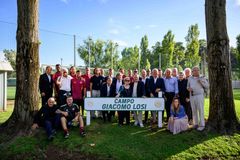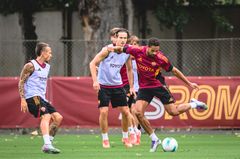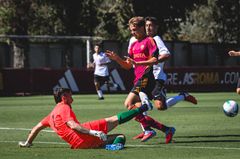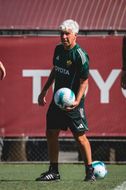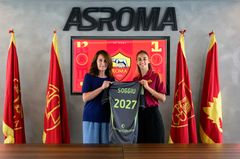

In the latest in our weekly series with members of the media, CNN World Sport anchor Amanda Davies joins us to discuss the particular challenges of reporting on huge stories during a worldwide lockdown.
Davies reflects on her career to date, picks out some of the notable stories she has covered in recent years, and offers her impressions on how football is working its way through the issues created as a result of the current Covid-19 outbreak...
Thanks for taking the time to speak to us, Amanda. Let’s start with the here and now – how has work changed for you in recent weeks, how much have things been affected by the lockdown?
"It's certainly very different. I’m speaking to you from ‘CNN Ealing’, I suppose - and I have to say I didn't buy my house with the view that it was going to turn into a TV studio!
“Life is certainly very different. And actually my last day in the office was the night of what should have been our final rehearsal before World Sport relaunched from a new studio. Sadly, we never got to do that launch because the lockdown started.
"So I'm now very much set up at home; I have a little office scenario, I’ve also joined the light ring generation. My colleagues always used to laugh at me because I’m a notorious technophobe, but now I’ve very much embraced lights, cameras, tripods and that. Although I don’t think the cameramen have any serious threat to their careers going forward…
“But it’s certainly very different. And I’m doing that at the same time as juggling looking after my daughter and home schooling. So there have been a few interesting scenarios, with her musical theatre lessons going while I am trying to conduct an interview. We’ve had some renditions of West End musicals in the background as I’m discussing Formula 1 finances.”
Did CNN send you equipment and other things to be able to continue to broadcast from home?
“Well, different anchors have different setups depending on their remit. I know Hala Gorani, for example, is fortunate because her husband is a cameraman – so she is hosting her show from her kitchen with a full setup.
"We are not doing full World Sport shows – so I have my laptop, I have a couple of phones, and I have been dealing with our tech team to discuss how to set things up as well as possible. It’s been an education.”
How did CNN approach the lockdown, in terms of balancing employee safety with needing to continue to broadcast accurate information at such a crucial period for the world?
“So I think CNN, as a company as a whole, has been incredible with how it's all been dealt with. This whole pandemic, really they have very much put safety and welfare and the health of its staff of at the forefront.
"So very, very early on, I think, much sooner than a lot of other companies, not just CNN but WarnerMedia [CNN's parent company] assessed its policies and its working practices. So they really focused on ensuring they had the fewest number of people in the office necessary. And obviously, every TV show needs a crew attached to it, so sport became a lesser priority – although we contributed more and more to the various news shows.
“I actually celebrated my 40th birthday on the second day of the lockdown – and it was also the day the Olympics was cancelled. My daughter, bless her, brought me balloons and a chocolate cake – and I kind of blew out the candles on the cake and then ran upstairs to jump on a live slot with Richard Quest, to talk about the Olympics being postponed.”
How difficult has it been – to keep on top of everything, given you have a child to look after as well?
“The juggle from home is real. I'm not going to lie. Balancing home and work life has certainly been a challenge. And, look, I’m a single working mum – I’ve always had to juggle to some extent. But it has made me realise how good I have become at, when I’ve been out on the road for stories, putting my life in boxes and partitioning it all. Doing it all from home has certainly provided a challenge, but I don’t think I’m unique in that.
“But I’ve also realised just how much of my job, and indeed what I love about my job, is meeting people and interacting with them face-to-face. Conducting interviews virtually is just not quite the same as engaging with someone and reading their body language. It’s very different.”
You are clearly very passionate about what you do. How did you get into journalism?
“I have always, always said that I consider myself to be one of life’s fortunate people – as I knew really, really early on what I wanted to do. And when I was 12 or 13 I decided that I wanted to be not just a journalist, but a sports journalist. I think what planted the seed was seeing my dad [former BBC journalist and English Football Association executive director David Davies] doing what he did.
“When I was growing up, he was working in a way that I’m not sure many people could do now. He would do politics and news during the week, and then sport at the weekend. He would take me to games with him at the weekend, when he did commentary or the reports for Grandstand and Match of the Day. I would sit next to him in the press box.
"I remember, in our kitchen, there was always his silver box with the ISDN kit and the microphone. I would get that out and play with it, and watch what he did when he was at the different stadiums.
“All the details are so clear to me – how he would prepare for his commentaries, or deliver his reports, and then the way they would be cut with the editor for broadcast later that night. That’s where I fell in love with it all. That’s the only thing I wanted to do.
“So at school, I set up the student paper – and I always did the sports pages. I think one of my first articles was about [ex-Manchester United footballer] Lee Sharpe. I was a big Lee Sharpe fan! I did work experience, I went to university. I did Geography at Oxford, although this was the period where media courses were just starting, but I did work experience whenever I could.
“Then I started at the bottom. I was a runner at Sky, then I went to Sky Sports News, then the BBC, and then CNN. From runner to editorial assistant to producer, I think I’ve had every job it is possible to have in the newsroom. My first job on the air was with the BBC, doing BBC World and the BBC News Channel, before I joined CNN in 2012.”
Do you think that breadth of experience helped you, and helps you now with putting together your shows and packages?
“I think my producers might say it's the worst thing possible! But yes, I think it is one of the best pieces of advice I ever got – and one of the best pieces of advice I could pass on to any aspiring journalists. Don’t turn down a job just because it’s not exactly what you want to do. Make sure you know everything you possibly can about the industry.
“What I’ve realised, being on air, is that knowing all the aspects that go into the show can help you understand things better, anticipate what can happen and be better prepared for every eventuality. I absolutely think it's made me better at what I do.
"When we are in the studio or out on the road, I am able to ask better questions – both in the production and interview settings – and that can only be a good thing.”
What other advice would you give for aspiring journalists looking to make their name in the industry?
"Every aspect you can learn about the industry, whatever work experience you get, will benefit you in the long run. The other thing I would say, it’s a quote from Roald Dahl that I love: ‘Above all, become passionate about it. Lukewarm is no good. Hot is no good either. White hot and passionate is the only thing to be.’
"That is so true – when you are doing an 18-hour day, or you are standing on a driveway outside a big organisation at -10 C waiting for something to happen… You have to be doing it because you love it. Because it’s not always as glamorous as it might seem.”
What are some of the more notable interviews or stories you can recall from your career?
“I’ve been fortunate to have had the chance to cover so many. The FIFA corruption scandal was incredible – I remember getting the call early in the morning, that the hotel had been raided, and I don’t think anyone realised just where the story is going to go from there.
"I was in such a race to get to the airport, that it wasn’t until I was boarding the plane that I realised I had left my wallet on my kitchen counter. And neither of my producers had even managed to make the flight! That’s when I realised you can’t get money out at a bank in a foreign country with just your passport...
“Other interviews stick with you because they are so joyful, or tell such fantastic stories. One that sticks out is with a man called Gerhard Noack, who few might know of – but he actually is essentially the man behind the careers of Formula 1 champions Michael Schumacher and Sebastian Vettel. He runs a karting centre in a tiny town in Germany, and my producer and I were desperate to get an interview – but he wouldn’t respond to calls.
"Eventually, my producer discovered her next-door neighbour was German, and asked her to help write a letter, in German, to him to ask for an interview. And I think, in the end, he quite liked the fact he got a written letter. Finally my producer Rachel got a phone call from his assistant saying, ‘You are the only person who has requested an interview through a letter. I don’t understand why I should do any interviews, but I like the fact you wrote to me – so come and visit.’
“So we got to visit his karting track, and see all the memorabilia and karts from the early careers of two of the greatest drivers motorsport has seen. It became one of those unusual, fascinating interviews with somebody that has had an integral role to play in the careers of two greats.”
Does that excitement of getting a good story, or the nerves that come with being on live television, ever go away?
“I don't think the excitement of television goes away. And I think that's why we do it. I love those moments – like the morning of the Champions League final, or the World Cup final, and just waking up and being in the stadium or wherever and feeling that tension about what is about to happen later that day.
“It is always one of those ‘pinch yourself’ moments – and it’s that excitement that I try to transmit to the viewers as well. Because these are historic sporting occasions. And I hope we have them again soon.”
Moving on to the current situation, what have you made of the way that football has been brought into the wider discussion about the pandemic – first about player wage deferrals, and now about the potential resumption of the season?
“I think we are always naïve if we think sports and politics don’t have a relationship – and football and the Premier League in particular, because it’s become one of the country’s biggest exports. And it’s high profile and people often look at it to lead the way.
“It is a difficult one for the industry, like any other, because the situation is unprecedented – and so what people are doing, and will continue to do, is just try to find a way through this minefield. I think from a football perspective, what has been shown up is the fact that there are so many stakeholders involved – and perhaps a lack of clear leadership at times has been exposed.
"Football authorities will say that is because they are following individual government strategies, and each government has been responding to events on different timeframes – and perhaps that is where some of the difficulty lies.
“In terms of wage deferrals, I think the difficulty is in the disparity between the top of the game and lower down the ladder. I think some of the players will feel they have been let down by clubs and leagues, and that they have been left to take the lead – but then, on a more positive point, so many players and clubs and sports have done so much with their platform for good during this period too. So sports can be applauded too for the work it does.
"One of the best stories CNN picked up recently was about Roma, and Roma Cares, delivering care packages to older fans – and really taking the initiative to become a valuable resource in the community. Other clubs have since followed suit, and that’s really special."
What do you make now about the chances of the season resuming? What’s the sense you get from people within the game?
“I think the first thing, the thing that really needs to come above everything else, is health and welfare. I know it's easy to say that, but we absolutely shouldn't lose sight of that. And it's very interesting to see how the different leagues are approaching it. You've got the likes of the French and the Dutch leagues that have stopped - and then you have the likes of Italy and Germany and the Premier League who are trying to resume.
“I think what they are all finding is that there is not really one ideal scenario. And that’s where the difficulty lies. For all the will for football to resume, just for the competition of it and to give people that joy again, there is not an ideal way to do it. And the decision-makers have got to battle with that and sort through it.
"I am glad it’s not me that has to make these decisions! There’s a lot of ideas being thrown around, and I think in the end it is about finding the least-worst option. That’s almost the best case scenario - finding the least-worst option.
“What will that end up looking like? Who knows. But what is very clear from everybody we’ve been talking to – European club associations, European leagues, clubs – there’s not a one-size fits all plan. What happens in Italy may not necessarily correlate in Spain, Germany or the UK. Each country is finding its own way.”
You mentioned briefly Roma’s initiatives – but what are some of your other memories or impressions of the club – or the city - that you have from your travels?
“I was actually going to have my first trip to Rome as a tourist during the first week of lockdown – as part of my 40th birthday celebrations. So thank you for bringing that up again!
"Sadly that has been postponed – but I’m very much hoping to come with my daughter next year to do it. I still haven’t had the chance to do the tourist sites, the Colosseum or the Vatican, and I can’t wait to do that.
“As a reporter, I did pop over to Rome for 24 hours for the Euro 2012 final. We were in Circo Massimo in anticipation of the final, where Italy were facing Spain in Kiev. Probably one of my hottest days ever at work – I think it was a record July temperature recorded there in the Fan Zone. Italy lost that day, so it was quite memorable for me going through those emotions with the supporters who were there.
“Obviously, from a club perspective, everyone remembers that Champions League comeback against Barcelona a few seasons ago. It was one of those great stories that few people expected - looking from the outside at least - and for us as at CNN Sport it was one of those stories that has everyone buzzing as they discuss it in the studio the next day.
“And then, as a Manchester United fan, from a personal perspective there’s obviously that Champions League tie back in 2006 too – although perhaps I shouldn’t discuss that too much again here!”
Amanda Davies is a sports anchor for CNN International, based in the network’s London bureau.
You can follow her on Twitter and Instagram via @AmandaDCNN.

 Tickets
Tickets
 Shop
Shop

















